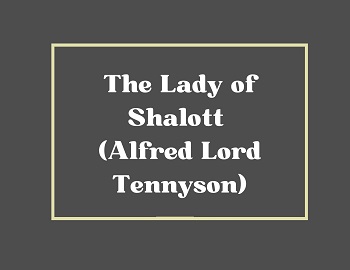Table of Contents
Adam’s Curse:
Introduction to the Poem:
“Adam’s Curse” is one of the finest poems in the volume “In the Seven Woods”. The poem is written in a colloquial style. It is in the form of a conversation between the poet, a beautiful woman, and his beloved. The poet’s beloved is Maud Gonne, and the beautiful woman is her sister. The title of the poem refers to the curse of God received by mankind through Adam, the first man created by the Maker. The poem stresses the idea that all fine and beautiful things such as love and poetry can be produced only by dint of hard work. It is according to Adam’s Curse that no one can escape hard work in this world. When the conversation turns to love, the poet thinks of his unsuccessful love.
Central Idea of the Poem:
The title “Adam’s Curse” suggests the central idea of the poem. It refers to the curse imposed on Adam, the first man created by the Maker, after his fall from easeful immortality to diligent mortality. Among other things God had said to Adam, “In the sweat of your face you shall eat bread”. Since then, human beings have been working hard to earn a living. Without hard work, nothing beautiful and fine can be created. The world may call a poet an idler, but it goes without saying that his poetic creations are the fruit of his very hard labor. Maintenance of feminine beauty requires hard work. Women must work hard to make themselves look attractive, beautiful, and winsome. The lover who wants to practice the lofty ideals of country love has probably to work hardest. The moon looking like a shell washed by time’s water reminds W. B. Yeats of his love which lost its warmth and zeal and finally proved a futile exercise. All beautiful things are short-lived. The moon, love, and youth possess short-lived charms. All beautiful things lose their beauty and freshness with time. All happiness is short-lived. But the poet does not suggest this all to nullify the value of human efforts without which nothing grand, glorious, and remarkable can be achieved.
Complete Paraphrase of the Poem:
At the end of one summer, the poet was sitting with his beloved (Maud Gonne) and her sister (Kathleen) who is gentle and beautiful. They were discussing poetry. The poet started the conversation. He said that sometimes poets have to put in very hard effort to produce a single line of poetry. Though written with hard work, poetry should appear to be the result of spontaneous and natural thought. If poetry does not appear to be natural, the poet’s efforts are all vain and futile.
If a poet’s poems do not appear natural and spontaneous it would be better for him to do some physical work. He may take up a kitchen maid work of cleansing the floor of the kitchen or he may take up the work of a poor stone-breaker who breaks stones in all conditions of weather. A poet should work hard to combine sweet-sounding words in such a way that the combination sounds like sweet and melodious music. His work is much harder but still the poets are called idlers by bankers, schoolmasters, and priests.
Then the beautiful woman (Maud Gonne’s sister) spoke in a sweet and gentle voice for which many young men would have fallen in love with her. She said that though in schools women are not taught how to become beautiful, yet every woman must know that she cannot be beautiful without working very hard.
The poet agreed that all beautiful and fine things are at times the result of hard and sincere effort. Love, like all beautiful things, is the result of diligence. There have been lovers who thought love to be something romantic. They tried to look wise and serious and quoted proofs of romantic love from old books written about romance and romantic love. Still, people believe that making love is a very easy thing.
The poet, his beloved, and her sister became silent and serious at the talk of love. They looked at the setting sun which was giving out ember-colored light. The moon was coming up. She looked like a shell washed by the waters of time. The stars too seemed to have been washed by the waters of time.
The poet thinks of his beloved and her ears. He recalls her youth when she was very beautiful. The poet was also very young at that time. He tried to make love to her. They were very happy in their youth. But now they look tired and pale like the moon. With the passage of time, the joy of their youth has faded away slowly but surely.
Complete Summary of the Poem:
It was the end of summer. W. B. Yeats, his beloved Maud Gonne, and her sister, Kathleen, were sitting together and discussing poetry. The poet said that writing poetry requires a lot of hard work. Sometimes even a single line of poetry may require labor spreading over several hours. However, all labor is lost if the line of poetry does not appear to be natural and spontaneous. A poet’s work is much harder than the work done by a kitchen maid in cleaning a kitchen pavement. Again, a poet’s work is much harder than the work done by a stone-breaker who breaks stones in all conditions of weather. Writing poetry is harder as it requires a lot of mental and imaginative effort. But still, a poet is severely criticized and cursed as an idler by the noisy set of bankers, schoolmasters, and priests.
As the poet finished talking about poetry, the beautiful gentle sister of Maud Gonne spoke very sweetly. Her voice was so low, sweet, and charming that many young men would have fallen in love with her. She remarked that the maintenance of the beauty of a woman requires a lot of work, though beauty culture is not taught in schools. On hearing this remark of the lady, the poet hastened to add that after the fall of Adam nothing fine has been achieved without hard labor. Lovers, for instance, would sigh for their unrequited love and quote previous examples from old books dealing with the topic of romantic love, but still love is criticized by many as something idle and useless.
The talk of love made the poet, his beloved, and her sister, silent, thoughtful, and sober. They saw the last dying traces of redness disappear from the sky. Soon the moon appeared in the bluish grey sky. She appeared like a shell washed by the waters of time.
The poet wished to tell his beloved that she was very beautiful in her days of youth and that he had struggled hard to love and win her. However, his hard efforts had gone futile. Their love could not be successful. It was only for a while that their love had flourished. Soon they had grown as weary-hearted as the hollow moon up in the sky.









Comments (No)